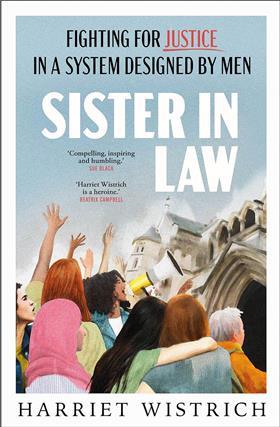'A beacon of hope'
Sister in law: Fighting for justice in a system designed by men
Harriet Wistrich
£16.99, Transworld Digital
★★★★✩
This is a book of highly readable stories. Individual stories of women who have endured a wide range of brutal injustices. It also tells the wider story of the Justice for Women campaign and how it has worked since 1990 to eradicate discrimination against women who have endured male violence. Above all, it is the story of how one formidable woman has used the law to drive change on behalf of the many women who have been let down by the legal system.
Harriet Wistrich, a human rights lawyer and feminist activist, describes her life’s work as ‘campaign lawyering’. She was not always a lawyer: having graduated with a degree in PPE from Oxford, she initially worked as a film-maker and activist before training as a solicitor in her 30s. She pursued the campaigning work she had begun in support of women such as Sara Thornton, who appealed the mandatory life sentence she had been given for killing her violent, alcoholic husband. Wistrich concluded: ‘The pressing need for more feminist lawyers in the justice system was plain.’

As a trainee solicitor, Wistrich worked at legal aid practice Winstanley-Burgess, where she specialised in immigration and asylum law, and cut her teeth in bringing civil proceedings against state institutions. She went on to work with Gareth Peirce at Birnberg Peirce, and her work took her into the dark side of the police, CPS, government departments and the prison system.
Sister in law describes a series of cases taken on by Wistrich over the course of her career. Many of these fights for justice have had a high-public profile, such as Sally Challen’s successful appeal to overturn her conviction for murdering her coercively controlling husband, and the failure of the police to investigate the crimes of the taxi driver and serial rapist John Worboys. Every case reflects an individual experience that is part of a bigger picture of the law so often not being fit for purpose.
Wistrich represents women from all backgrounds and demographics: ‘The one common factor is that they are all victims of male violence and abuse.’ She addresses misogyny in the police, ‘outdated and discriminatory attitudes to women’, and all the ways the criminal justice system actively works against women.
Wistrich’s legacy – in addition to all the women’s lives she has changed – is the Centre for Women’s Justice, set up in 2016 to nurture the feminist lawyers of the future and stand ‘as a beacon of hope for victims of male violence who have been ill-served by the machinery of the state that is supposed to keep them safe’.
Catriona Moore is policy manager at SEND legal advice charity IPSEA
Pictured above: Sally Challen, with lawyer Harriet Wistrich, leaving the Old Bailey after hearing she would not face a retrial over the death of her husband Richard Challen in 2010































No comments yet